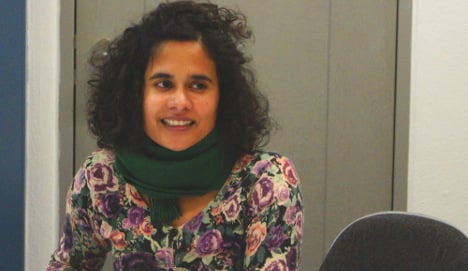The Berlin interior senator has now asked German visa authorities to reconsider their decision to deny Simran Sodhi a visa extension at the start of May.
The 27-year-old, who moved to Germany in 2008, has worked as an integration guide helping immigrants find their feet in a deprived district of Berlin since January.
Yet after six years in the country, the German visa authorities (Ausländerbehörde) sent her a letter saying she must leave by the end of May.
In their final ruling, the authorities said that as Sodhi holds a Masters degree, she is overqualified for her current position, where she helps newly-arrived immigrants find accommodation and employment in the south-east Berlin district of Treptow-Köpenick.
Sodhi is also being underpaid in her state-funded job, the authorities found, adding that there existed no "public interest" in her continued employment.
Outraged at this treatment, Sodhi's colleagues at the "With Wings and Roots" film and education project launched a petition on Monday demanding she be allowed stay and continue her work.
"Simran's application … hinged on her having graduated from a German university," Sodhi's colleague at the project Christina Antonakos-Wallace told The Local.
"As such, the permit is tied to working in one's field of study. In the Ausländerbehörde's decision, they imply that working as a social worker with migrants and refugees is not an appropriate job for someone with a Masters in social sciences. This is something we find ridiculous," she added.
“We consider the actions of the authorities extremely contradictory,” reads the text accompanying the petition, which by Wednesday lunchtime had gathered over 33,000 signatures. “The Berlin Senate offers only limited financial resources for this [integration] work.
“Therefore, Simran's employer cannot pay her more. The order that Simran must leave Germany because of this contradiction is absurd."
At the same time, the Treptow-Köpenick district authority and the district's Centre for Democracy sent letters to Berlin's Senator for the Interior Frank Henkel appealing to him to step in on her behalf.
Pressure grew as opposition politicians flocked to the cause on Tuesday, when Henkel issued a statement calling for a review of the case.
Although the Ausländerbehorde had done an acceptable job, said Henkel, he did not support their assessment of whether or not Sodhi's work served the public interest.
"It would be in my view a false signal if the impression was given that Berlin is penalizing qualifications and public engagement,” he said.
"In my view there is a great interest in finding a solution for the party concerned. But that has to happen in accordance with the applicable law. If there's a way that she can continue her job we will try to facilitate this."
Sodhi also speaks Hindi, Urdu, English and German in her work and also leads workshops for young people and adults facing discrimination and racism problems.
With all parties hoping for a solution, Green politician Ramona Pop told regional broadcaster rbb that forcing Sodhi to leave Germany was a ridiculous idea.
"It gets even better when the expulsion is justified by a too-low income which is paid by the Berlin state as an employer,” she said sarcastically. “Then it just becomes Absurdistan."
"We have been incredibly happy about the support the petition has received," petition author Antonakos-Wallace told the Local. "Simran's absurd story has touched on a number bigger structural problems in immigration policy, public funding, and even the undervaluing of Integration workers and social workers in general."
Yet she remained cautious about Henkel's intervention. "We welcome his statement, but until a decision has been made, nothing is guaranteed. We have to continue to apply pressure and show our support."




 Please whitelist us to continue reading.
Please whitelist us to continue reading.
Member comments